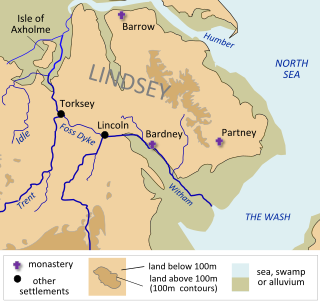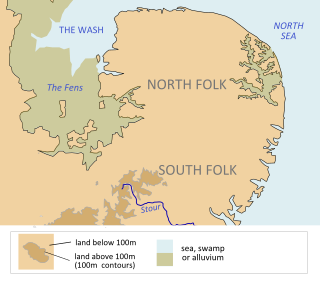This article relies largely or entirely on a single source .(December 2024) |
Biscop Beding is a semi-Legendary King of Lindsey who appears in the Anglian Collection of Anglo-Saxon genealogies. He is notably the twelfth king of that line. [1]
This article relies largely or entirely on a single source .(December 2024) |
Biscop Beding is a semi-Legendary King of Lindsey who appears in the Anglian Collection of Anglo-Saxon genealogies. He is notably the twelfth king of that line. [1]

Deira was an area of Post-Roman Britain, and a later Anglian kingdom.

The Kingdom of Lindsey or Linnuis was a lesser Anglo-Saxon kingdom, which was absorbed into Northumbria in the 7th century. The name Lindsey derives from the Old English toponym Lindesege, meaning "Isle of Lind". Lindum Colonia was the Roman name of the settlement which is now the City of Lincoln in Lincolnshire. Lindum was a Latinised form of a native Brittonic name which has been reconstructed as *Lindon.
Tytila was a semi-historical pagan king of East Anglia, a small Anglo-Saxon kingdom which today includes the English counties of Norfolk and Suffolk. Early sources, including Bede's Ecclesiastical History of the English People, identify him as an early member of the Wuffingas dynasty who succeeded his father Wuffa. A later chronicle dates his reign from 578, but he is not known to have definitely ruled as king and nothing of his life is known. He is listed in a number of genealogical lists.
Finn, son of Folcwald, was a legendary Frisian king. He is mentioned in Widsith, in Beowulf, and in the Finnesburg Fragment. He is named in the Historia Brittonum, while a Finn, given a different father but perhaps intending the same hero, appears in Anglo-Saxon royal pedigrees.
Various gods and men appear as sons of Odin in Old Norse and Old English texts.
Wecta is a figure mentioned in the Anglo-Saxon Chronicle and the Historia Brittonum.

The Iclingas were a dynasty of Kings of Mercia during the 7th and 8th centuries, named for Icel or Icil, great-grandson of Offa of Angel, a legendary or semi-legendary figure of the Migration Period who is described as a descendant of the god Woden by the Anglo-Saxon royal genealogies.

The Wuffingas, Uffingas or Wiffings were the ruling dynasty of East Anglia, the long-lived Anglo-Saxon kingdom which today includes the English counties of Norfolk and Suffolk. The Wuffingas took their name from Wuffa, an early East Anglian king. Nothing is known of the members of the dynasty before Rædwald, who ruled from about 599 to c.624. The Viking invasions of the 9th century and Dissolution of the monasteries in the 16th century both led to the destruction of documents relating to the rule of the Wuffingas.
Ealdwulf, also known as Aldulf or Adulf, was king of East Anglia from c. 664 to 713. He was the son of Hereswitha, a Northumbrian princess, and of Æthilric, whose brothers all ruled East Anglia during the 7th century. Ealdwulf recalled that when he was very young, he saw the Christian/pagan temple belonging to his ancestor Rædwald.

Eni or Ennius was a member of the Wuffing family, the ruling dynasty of the kingdom of East Anglia. He was the son of the semi-historical pagan king Tyttla and the brother of Rædwald, who both ruled East Anglia.

Wuffa is recorded in the Anglo-Saxon genealogies as an early king of East Anglia. If historical, he would have lived in the 6th century.
Wihtlæg, Whitlæg, Wighlek, Wiglecus, Wiglek, Witlac or Viglek is a legendary king of either Denmark or Angeln in Germanic legends. He is known in Saxo's kings of Denmark by the name of Vigletus.
Creoda is a shadowy figure from early Wessex history whose existence is disputed.

The Anglian collection is a collection of Anglo-Saxon royal genealogies and regnal lists. These survive in four manuscripts; two of which now reside in the British Library. The remaining two belong to the libraries of Corpus Christi College, Cambridge and Rochester Cathedral, the latter now deposited with the Medway Archives.
The Prologue is the first section of four books of the Prose Edda, and consists of a euhemerized account of the origins of Norse mythology. According to the Prologue, the Norse gods originate from the Trojans described in Homer's poetry, and are King Priam's descendants. Priam's grandson Thor traveled throughout the world after leaving Thrace, fighting monsters and a dragon; he eventually came far north where he married a local named Sif. From them descended both the Norse gods as well as royal lines of various kingdoms.
A number of royal genealogies of the Anglo-Saxon kingdoms, collectively referred to as the Anglo-Saxon royal genealogies, have been preserved in a manuscript tradition based in the 8th to 10th centuries.
Langfeðgatal is an anonymous, twelfth-century Icelandic genealogy of Scandinavian kings.
Beda Bubbing is a semi-Legendary King of Mercia who appears in several Anglo-Saxon genealogies, most notably the Anglian Collection.